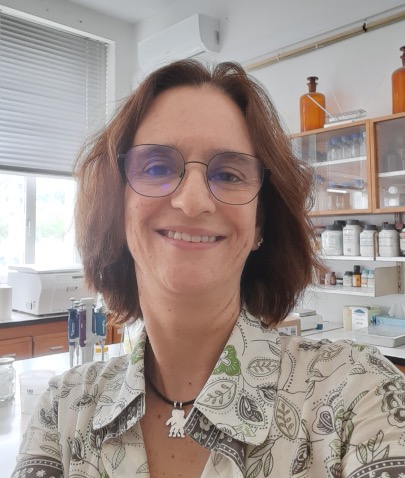
- +351 213 652 600
- +351 213 632 105
- Enviar Mail
- Download CV
- Orcid
- NOVA Research
Sofia Cortes
Grupo GHTM: VBD PhD members, Vector-borne diseases and pathogens
Presently I am Assistant Researcher in Research and Teaching Unit of Medical Parasitology at Instituto de Higiene e Medicina Tropical (IHMT), Universidade NOVA de Lisboa (NOVA, Lisbon, Portugal) and member of the Vector-Borne Diseases (VBD) group of the of Global Health and Tropical Medicine Research Center (GHTM) hosted at IHMT. I have a degree in Biology and a PhD in Biomedical Sciences, Parasitology (UNL).
In 2014, I was awarded with a two-year Marie Sklodowska-Curie grant at TH Wildau, Germany, focusing on phenotypic, proteomic, and spectrometric characterization and differentiation of Leishmania hybrids and search for biomarkers. Later, in 2017, in line with previous interests and research on drug discovery for leishmaniasis, I was awarded with an FCT Investigator starting grant focusing on studies to find active compounds against Leishmania sp.
Recently, in 2021, through support of pharmaceutical Industry (MSD Animal Health and LETI Pharma), I was the PI of a national project on canine leishmaniosis to update the seroepidemiological status of the disease in Portugal and determine its risk factors. To date I have participated in 14 international (EU/FP6, EU/FP7, BMBF) and national (FCT, Pharma Insdustry) research projects, 4 as principal Investigator and 2 international networks. I am author/ co-author of 1 book chapter, 46 publications. I also teach in national and international universities and coordinate two curricular units in Leishmaniasis and Cell culture applications under the Medical Parasitology and Biomedical Sciences Masters at NOVA IHMT.
My research topics and interests fall within Medical and Health Sciences with emphasis on Parasitology. My main outputs are related to human and canine leishmaniasis, Leishmania drug susceptibility and drug development, diagnosis, host-parasite interactions, molecular epidemiology, and population genetics and canine leishmaniosis.
- Mendes A, Armada A, Cabral LIL, Amado PSM, Campino L, Cristiano MLS, Cortes S. 1,2,4-trioxolane and 1,2,4,5-tetraoxane endoperoxides against Old-World Leishmania parasites: in vitro activity and mode of action. 2022. Pharmaceuticals. 15, 446. https://doi.org/10.3390/ph15040446
- Kuhls K, Moskalenko O, Sukiasyan A, Manukyan D, Melik-Andreasyan G, Atshemyan L, Apresyan H, Strelkova M, Jaeschke A, Wieland R, Frohme M, Cortes S, Keshishyan A. 2021. Microsatellite based molecular epidemiology of Leishmania infantum from re-emerging foci of visceral leishmaniasis in Armenia and pilot risk assessment by ecological niche modelling. PLOS Negl Trop Dis.15(4): e0009288. https://doi.org/10.1371/journal.pntd.0009288
- Cortes S, Bruno de Sousa C, Morais T, Lago, JHG, Campino L. 2020. Potential of the natural products against leishmaniasis in Old World – a review of in vitro studies. Path Global Health, 14(4):170-182. doi: 10.1080/20477724.2020.175465
- Cortes S, Albuquerque-Wendt A, Maia C, Carvalho M, Lima I, De Freitas L., Campino L. 2019. Elucidating in vitro and in vivo phenotypic behaviour of L. infantum/L. major natural hybrids. Parasitol, 146: 580–587. https://doi.org/10.1017/S0031182018001993
- Cortes S, Albuquerque A, Cabral L, Lopes L, Campino L, Cristiano MLS. 2015. In vitro susceptibility of Leishmania infantum to Artemisinin derivatives and selected trioxolanes. Antimicrobiol Agents Chemother. 59 (8), 5032-35. DOI: 10.1128/AAC.00298-15.